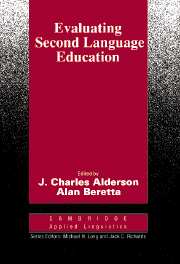Book contents
- Frontmatter
- Contents
- List of contributors
- Series editors' preface
- Acknowledgements
- Introduction
- I EVALUATION OF LANGUAGE EDUCATION: AN OVERVIEW
- II CASE STUDIES OF CURRENT PRACTICE
- Chapter 1 Insiders, outsiders and participatory evaluation
- Chapter 2 Evaluating a program inside and out
- Chapter 3 The ‘independent’ evaluation of bilingual primary education: a narrative account
- Chapter 4 Issues in evaluating input-based language teaching programs
- Chapter 5 Program-defining evaluation in a decade of eclecticism
- Chapter 6 Evaluation of classroom interaction
- Chapter 7 Moving the goalposts: project evaluation in practice
- Chapter 8 What can he learned from the Bangalore Evaluation
- III GUIDELINES FOR THE EVALUATION OF LANGUAGE EDUCATION
- Appendices
- Author Index
Chapter 1 - Insiders, outsiders and participatory evaluation
from II - CASE STUDIES OF CURRENT PRACTICE
Published online by Cambridge University Press: 05 October 2012
- Frontmatter
- Contents
- List of contributors
- Series editors' preface
- Acknowledgements
- Introduction
- I EVALUATION OF LANGUAGE EDUCATION: AN OVERVIEW
- II CASE STUDIES OF CURRENT PRACTICE
- Chapter 1 Insiders, outsiders and participatory evaluation
- Chapter 2 Evaluating a program inside and out
- Chapter 3 The ‘independent’ evaluation of bilingual primary education: a narrative account
- Chapter 4 Issues in evaluating input-based language teaching programs
- Chapter 5 Program-defining evaluation in a decade of eclecticism
- Chapter 6 Evaluation of classroom interaction
- Chapter 7 Moving the goalposts: project evaluation in practice
- Chapter 8 What can he learned from the Bangalore Evaluation
- III GUIDELINES FOR THE EVALUATION OF LANGUAGE EDUCATION
- Appendices
- Author Index
Summary
Introduction
This chapter reports on the evaluation of a nation-wide project in English for Specific Purposes in Brazilian Federal Universities. The Project evaluation was designed from the beginning to involve as many as possible of the Project participants in the design, execution and interpretation of the evaluation, in an attempt to reflect the voluntary and participant-oriented nature of the ESP Project, to take account of a strong distrust of outside evaluators and externally oriented evaluations, and, perhaps above all, to carry out an evaluation that reflected as closely as possible the concerns and insights of those involved in Project implementation. The chapter presents the rationale, design, execution and results of this attempt and concludes with reflections on the problems and limitations of the evaluation and recommendations for future attempts at participatory evaluation.
A common paradigm for the conducting of formal evaluations of language education projects, particularly those funded by British aid agencies, is that of the JIJOE: the Jet-In Jet-Out Expert. Some eminent ‘expert’ in applied linguistics, syllabus design, methodology or a related aspect of language education is approached by an organisation like the British Council or the Overseas Development Administration (ODA), and invited to visit a project in some exotic location, for a period of up to three weeks. During that time, the expert is to familiarise him or herself with the project, its aims and objectives, its history, personnel, achievements, problems and hopes, and at the end she or he submits a report on the project, with recommendations as to the future development, abandonment or modification of the project.
- Type
- Chapter
- Information
- Evaluating Second Language Education , pp. 25 - 60Publisher: Cambridge University PressPrint publication year: 1992
- 12
- Cited by

